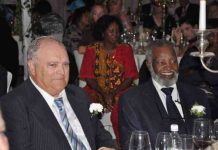THE SME Bank, a semi-parastatal, blew about three quarters of N$60 million start-up capital from the government buying a building now owned by a mysterious trust whose identity its operator has declined to disclose.
The information comes amid findings by The Namibian that the Bank of Namibia stopped awarding the financial institution a banking licence in 2010 because one of the bank’s linchpins, Enoch Kamushinda, was deemed to “lack integrity” and had no “respect for corporate governance”.
The splashing of cash on a building and huge salaries within the first three months after opening its doors to the public has accounted for the bank’s failure to serve small businesses it was set up to help, people familiar with the bank said.
The Namibian understands that N$25 million was spent on buying the premises and another N$20 million on refurbishments.
But more questionable is why the Small and Medium Enterprises Bank Pty Ltd’s offices were not registered directly in the bank’s name but given to the Namibia Financing Trust.
The SME Bank chairperson, Frans Kapofi, has been avoiding The Namibian when it sought explanation on the mysterious trust and why the bank’s main asset was not registered in the company’s name.
Kapofi said they were in the process of transferring the building to the SME Bank’s direct ownership but declined to explain why it was not done at the onset. Modern corporate governance rules frown upon trusts that operate as businesses because they are often abused as their protection by law are much better than that of companies.
People familiar with the negotiations to acquire the building said the SME Bank had been the face but the trust was only revealed at the time of the signing.
Amid the cash crunch, questions continue to be raised why Namibia’s central bank allowed someone with a highly tainted past and who has been described as not “fit and proper” to hold more than five percent shares in SME Bank to be become a director.
The initial ownership structure of SME Bank was that World Eagle, a company owned by Enoch Kamushinda, would have held a 37% stake in the SME Bank. This structure was rejected by the Bank of Namibia in 2010 after it undertook a due diligence (a background check) on Kamushinda who was pivotal in setting up the bank.
The Namibian government, through the Namibia Financing Trust, holds a 65% stake in the SME Bank while MetBank holds a 30% stake and Kamushinda, through World Eagle, the remaining five percent. Kamushinda, however, also holds 10% stake in Metropolitan Bank (MetBank).
A substantial part of Bank of Namibia’s findings came from Kamushinda’s first “home regulator” the Reserve Bank of Zimbabwe, which allegedly gave a negative review of the once flourishing Zimbabwean banker. Central bank sources said the findings pointed out that Kamushinda allegedly “lacked integrity, had no respect for corporate governance and was a questionable businessman and had the ability to pressurise and twist boards’ arms” into making decisions that benefitted him.
Bank of Namibia officials visited Zimbabwe as part of their investigations.
Bank of Namibia refused to give details of their investigations, apart from confirming that Kamushinda was assessed to determine his degree of “fitness and probity”.
“It is not considered appropriate for the Bank of Namibia to discuss matters pertaining to an individual in a public domain. For confidential reasons, the Bank is, therefore, not in a position to share such information,” said Ndangi Katoma, Bank of Namibia spokesperson.
Katoma said Kamushinda met the criteria to be a director though not a substantial shareholder.
Katoma also noted that the Bank of Namibia decided that all individuals will only be allowed to have a five percent stake in the bank to prevent dominance and to allow for a future diverse ownership of the SME Bank.
The Ministry of Trade and Industry pushed for the establishment of the SME Bank after its SME Credit Guarantee scheme collapsed.
Some Bank of Namibia sources claim that the central bank was reluctant to license the new bank, but “political muscle” was used to push through its approval and eventual licensing. The central bank denied that it was put under political pressure to issue the SME Bank with a licence.
Trade Minister Calle Schlettwein told The Namibian last month that the reasons for Bank of Namibia’s initial refusal to issue the SME Bank a banking license were “water under the bridge” but refused to go into details.
The media in Zimbabwe paint Kamushinda’s past as being chequered. The Financial Gazette weekly newspaper in Harare reported in September 2004 that Kamushinda’s house in Harare was raided by Zimbabwean law enforcement agencies in connection with the abuse of funds meant to support cash-strapped farmers.
The Financial Gazette stated that Kamushinda resigned from his position as Executive Chairman of Metropolitan Bank at the “behest of the Reserve Bank of Zimbabwe” in 2004.
The Reserve Bank of Zimbabwe allegedly cited “inherent corporate governance problems” at the Metropolitan Bank.
At about that same time the Governor of the Reserve Bank of Zimbabwe, Gideon Gono, allegedly barred major shareholders of commercial banks from holding executive positions.
Kamushinda refused to comment claiming that according to Namibia’s banking regulations, directors are not allowed to make media statements except for the board chairpersons.
“So don’t even waste your time trying to speak to me,” he said. He also complained of harassment when attempts were made to get him to respond on the Zimbabwean media reports about him.
Kapofi did not respond to questions about Kamushinda or other details of the trust.





